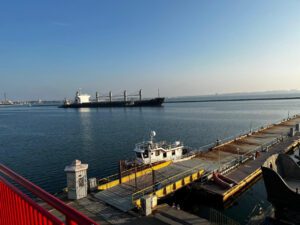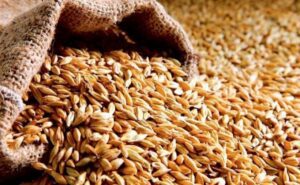
Sabotage by Russian inspectors in the Joint Coordination Center (JCC) of inspections of vessels bound for the Ukrainian Black Sea ports leads to low efficiency of their inspection – about 70 grain carriers piled up for a week to enter the “grain” corridor, and 30 – to leave.
According to the broker company Spike Brokers (Kiev) in Telegram-channel, grain traders are forced to lay more and more costs for demurrage of ships (up to 30 days) in the price of agricultural products, which “kills” the benefits for agricultural producers. Because of this, farmers are actively exporting their goods by land, strengthening trade relations with end consumers in Europe.
According to a brokerage company, for the past week, it has made deals for December-February delivery of feed wheat from Ukraine to Poland for $237/ton, rapeseed (non-GMO) to Germany – €595/ton, soybeans (GMO) to Ukrainian deep-sea ports – $415/ton. No data on sunflower sales have been made public this week.
She specified that domestic corn prices have stabilized at $205-230, depending on the place of delivery – in the port or to the land border crossings. Exchange quotations for wheat this week are in the nature of an “inversion” (a reverse market where spot is more expensive than contracts for future months). Recent buyer indications for the past week are DAP Poland (border) $210-220, DAP Turkey (port) $260-270, DAP Romania (port) $255-265.
“The proximity of the holiday month creates some constraints on the efficiency of cargo handling in Europe. Most buyers in Europe do not want to receive shipments by truck/rail between December 20 and January 5. In the direction of ports, buyer demand is expected to decline significantly until vessel throughput efficiency improves,” Spike Brokers stressed in a statement.
In turn, with low selling prices of wheat in Ukraine and the high cost of its logistics, domestic producers are suffering significant losses, which significantly constrains its supply. The latest indications of buyers: DAP Poland (border) – $230-245, DAP Hungary (border) – $230-242, DAP Ukraine (Danube ports) – $240-245.
According to the trader, the purchasing prices of oil extraction plants in Ukraine adjusted from $450 to $350 excluding VAT per ton of sunflower seed delivered to the plant: the saturation of demand in Ukraine occurs against the background of the fall in vegetable oil prices to $ 200 per ton. Thus, while oil prices on foreign markets will remain stable, there will be an increase in the supply of sunflower for export.
The latest indications of sunflower seed buyers: DAP Bulgaria (center) – $540-560, DAP Romania (center) – $500-530, DAP Hungary (center) – $540-555.
In addition, the saturation of the EU market with rapeseed from Ukraine and Eastern European countries does not give any chance for price strengthening at the moment. Latest buyer indications: DAP Germany (east) – €550-560, DAP Hungary (center) – €540-550.
“The soybean market remains at last week’s levels. Producers remain with good soybean balances for sale,” the brokerage clarified.
The latest soybean buyer indications for the week: non-GMO DAP Italy – €545-550, GMO DAP Italy (south) – €545-550.
A representative of the trading department of A.G.R. Agroholding. Group in a survey by Interfax-Ukraine agency noted that since the beginning of Russian military aggression, the logistical leverage for agricultural exports from Ukraine has increased, freight prices have risen, energy and fuel prices have risen. As a result, the group is forced to spend about $200 per ton of exports, a huge amount of money compared to the prewar $45-50 per ton.
“With the start of the war, we changed our crop rotation and switched to oilseed crops as much as possible – that’s more than 60% of our crops this year. Corn is a comfortable crop, but energy-intensive, and with the price of energy, gas, it’s just not profitable to work with. As a result, we have reduced the volume of its sowing and to a greater extent switched to oilseeds, thereby reducing the burden on the railway and road transport and combine maintenance costs, “- said the interlocutor of the agency.

Another seven ships with 290 thousand tons of agricultural products for countries, Asia and Europe left the Ukrainian ports of Chornomorsk, Odessa and Pivdenny on Thursday, the Ministry of Infrastructure of Ukraine reports.
“In particular, among them are Esentepe with 29,000 tons of sunflower seeds for Oman and Key Knight with 67,000 tons of corn for China,” the agency said on its Facebook page.
In total, since the launch of the first vessel with Ukrainian food, 10 million tons of agricultural products have been exported, and the number of ships that left Ukrainian ports for the countries of Asia, Europe and Africa with food has reached 430.
As reported, in Istanbul on July 22, with the participation of the UN, Ukraine, Turkey and Russia, two documents were signed on the creation, first, for a period of 120 days, of a corridor for the export of grain from three Ukrainian ports: Chernomorskaya, Odessa and Yuzhny. Ukraine set as its goal to export 3 million tons of agricultural products per month as part of the initiative.
After Russia announced on October 29 that it was withdrawing from the “grain initiative” because of an alleged Ukrainian attack on ships in Sevastopol, exports were interrupted for several days, but on October 2 the barriers were finally lifted.

US Secretary of State Anthony Blinken said Washington “strongly urges” the Russian government to resume its participation in the Black Sea Grain Initiative and “completely comply with the agreements.”
Blinken’s statement, released by the State Department, dismisses that the failure to implement the agreement will have a direct impact on low- and middle-income countries and world food prices, as well as exacerbate humanitarian crises and food security.
Washington “urges all parties to continue this critical life-saving initiative.”
As reported, the Ministry of Defense of the Russian Federation announced the withdrawal of Moscow from the agreements on the export of grain from the ports of Ukraine. They claim that allegedly Ukraine, with the participation of British specialists, carried out an attack “against the ships of the Black Sea Fleet and civilian ships involved in ensuring the security of the” grain corridor “.
On July 22, representatives of Russia, Ukraine, Turkey and the UN signed an agreement in Istanbul on the creation of a sea corridor for the export of Ukrainian grain from the ports of Chornomorsk, Odessa and Yuzhny for a period of 120 days.

The Joint Coordinating Center (JCC) announced that 60 vessels are expected to join the Black Sea Grain Initiative.
“Currently, 113 vessels are registered for inspection by the SKC, and another 60 are waiting to join the Black Sea Grain Initiative in Turkish territorial waters,” the SKC said in a statement.
According to the center, 97 ships waiting to leave the ports of Ukraine have already loaded more than 2 million tons of food.
The SKC reported that on October 24, four dry cargo ships left Ukrainian ports. Having received permission from the center, they transport a total of 159,662 tons of food.
The vessel Flag Lama (34,430 tons of sunflower meal and 30,673 tons of corn) is heading for China, the vessel C Faith (56,789 tons of wheat) is heading for Vietnam. Dry cargo ship BSL Calypso will deliver 23.5 thousand tons of corn to Italy and Spain, dry cargo ship MBC Daisy – 14,270 tons of wheat to Algeria.
The SKC specified that “the grain that arrived at the destination can be processed and then transported to other countries.”
“As of October 24, the total tonnage of grain and other agricultural products exported from three Ukrainian ports is 8,673,198 tons. In total, 772 ships have been allowed to move at the moment – 389 to arrive at Ukrainian ports and 383 to leave them,” – said in the message of the SKC.
On July 22, in Istanbul, with the participation of the UN, Russia, Turkey and Ukraine, a document was signed on the creation of a corridor for the export of grain from three Ukrainian ports: Chernomorsk, Odessa and Pivdenny.

Ukraine exported 1.7 million tons of agricultural products from the ports of Odesa, Chornomorsk and Pivdenny in the first month of the grain initiative, the press service of the Ministry of Infrastructure of Ukraine reported on Friday.
According to the release, during August, 68 ships left the unlocked ports, the ports of destination of which are located in 18 countries of the world.
At the same time, 19 vessels departed from the port of “Odesa”, 13 from “Pivdenny”, and the port of “Chornomorsk” sent 36 vessels.
According to the ministry’s announcement, as part of the grain initiative, three times more agricultural products were exported from the ports of Odesa in August than during this month by road transport.
“Only in August, more than 1.7 million tons of food were exported through the ports of Great Odesa. During the same period, almost 1.6 million tons were exported through the Danube ports, about a million tons by rail, and more than 600 thousand tons by road,” commented the Minister of infrastructure of Ukraine Oleksandr Kubrakov.
According to him, in September, it is planned to reach the rate of transshipment through unblocked sea ports at the level of at least 3 million tons of products. At the same time, it is planned to export at least 8 million tons by all modes of transport.
According to the ministry, in August, Odesa Port exported 419,000 tons of agricultural products, Chornomorsk – 848,000 tons, and Pivdenny – 459,000 tons. At the same time, Ukrainian agricultural products went mainly to Asia (726 thousand tons), Europe (640 thousand tons) and Africa (365 thousand tons). Also, 60.8 thousand tons were sent to Ethiopia and Yemen as part of the UN food program.
According to the ministry, 66.9% of exported agricultural products fell on corn, 21.6% – on wheat, 4.8% – on barley and 6.7% on other agricultural crops: sunflower, rapeseed, bran and pulp.
In turn, Kubrakov emphasized that in August, about 5 million tons of agricultural products were exported from the unblocked and Danube ports, by rail and by road. According to him, this is a record figure since the beginning of the full-scale invasion of Russia.
As reported, on July 22 in Istanbul, at the suggestion of the UN, Ukraine, Turkey and UN Secretary General Antonio Guterres signed an initiative on the safe transportation of grain and food products from the Ukrainian ports of Odesa, Chornomorsk and Pivdenny.
AGRICULTURAL PRODUCTS, EXPORTED, Grain initiative, ODESA, PORTS

President of Ukraine Volodymyr Zelensky said that the implementation of the grain initiative to export Ukrainian grain made it possible to reduce the severity of the food crisis.
“It is very important that the grain export initiative yields results. Since the beginning of its implementation, 16 vessels with grain for seven countries on three continents have already left Ukrainian ports. This is Europe, Asia, Africa,” he said in a traditional video message on Saturday.
According to him, “almost half a million tons of agricultural products are on board: corn, wheat, sunflower oil, soybeans and other goods that are absolutely necessary on the world market.”
“This has already made it possible to reduce the acuteness of the food crisis, gave some hope for peace to the countries that consume our agricultural products. And in the future, it can help to completely remove the food crisis from the global agenda,” he said.
Of course, the president noted, “if the partners ensure the implementation of the safe part of the initiative and prevent Russian provocations and terror at sea or against our ports.”
Zelensky noted that “the first ship has already arrived for loading under the UN World Food Program – this is the supply of grain, in particular, for Ethiopia, where the situation with hunger is especially severe. Now the vessel is being prepared for departure from the Yuzhny port.
According to him, “in less than two weeks, our three ports – Odessa, Chornomorsk and Yuzhny – managed to export such a volume that is equal to all agricultural exports by road in July and more than two-thirds of exports by rail over the past month” .
“These are jobs for our people, these are the funds that are needed for our sowing next year, and this is our state budget revenues. Increasing economic activity is an indispensable element on the path to victory,” the president said.